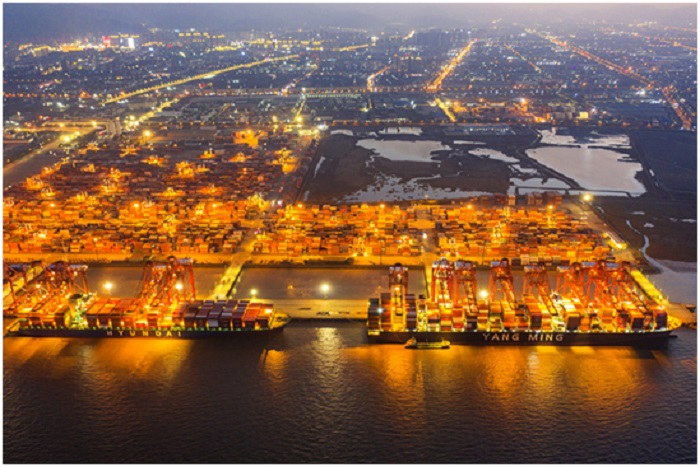



The world is paying close attention to whether the global economy can shake off recession in 2021.
Whether the world economy will secure a robust rebound or drag itself uphill toward recovery depends on the results of global control of the COVID-19 pandemic, countries’ determination and capabilities to coordinate virus control and economic and social development, as well as their concrete actions to seize the opportunity of innovation-driven development and open cooperation.
As COVID-19 vaccines have been gradually launched, the international community is full of expectations for the global economic recovery this year.
The International Monetary Fund (IMF) predicted that the global growth will rebound to 5.2 percent in 2021, while the Organization for Economic Cooperation and Development (OECD) forecast that the world economy will grow 4.2 percent this year.
However, it should be noted that the economic recovery will be uneven across the world and face uncertainties. World Bank Group President David Malpass said it would take two to three years for global output to return to pre-pandemic levels.
To effectively contain the COVID-19 pandemic is the key to global economic recovery. Faced with a second wave of infections, some countries have to press the “pause” button on many aspects of economic and social development.
The longer the pandemic and corresponding lockdown measures last, the deeper the economic recession, and the harder it is for recovery, observed Martin Wolf, chief economics commentator of the Financial Times, expressing his worries.
Just as the world economy has been caught in recession because of the outbreak, it will surely resume growth when the disease is gradually brought under control.
In this sense, ensuring the accessibility and affordability of COVID-19 vaccines in all countries is essential for securing a balanced global recovery and the inclusive growth of the global economy in the post-epidemic era.
Looking back at 2020, people may find it reassuring that countries and regions that reached good results in pandemic control could quickly climb out of recession and steer their economy back to the track of recovery.
In particular, China has achieved strategic achievements in balancing epidemic prevention and control and economic and social development, and become the only major economy worldwide to secure positive growth amid the outbreak. This fully proves that timely and effective control of the epidemic is crucial for economic recovery.
It is expected that the international community will forge greater determination to defeat COVID-19 with solidarity and put in stronger efforts to coordinate pandemic control and social and economic development in 2021.
Innovation-driven development is believed to be an important means for countries to foster new opportunities in crises and create new prospects in the face of changing circumstances.
New technologies, business forms and platforms have thrived amid the pandemic, and are expected to continue to empower traditional industries and bring more changes in the forms of economic activity.
German media pointed out that the year 2020 was an impressive testament to the potential of science and technology, while a report released by the World Trade Organization (WTO) said the world economy is shifting toward digitalization and informatization.
Undoubtedly, generating new development drivers through scientific and technological innovation and digital transformation will be an important measure for countries to adapt to changes and turn crisis into opportunity.
To foster a favorable environment for the development of digital economy, strengthen the digital infrastructure, vigorously develop environment-friendly industries and form a new and efficient economic system will be an obvious choice for meeting future development needs and allowing more people to enjoy shared prosperity.
By creating more opportunities for open cooperation and advancing trade and investment liberalization and facilitation with greater efforts, countries can inject huge impetus to the global economic recovery in the post-pandemic era.
Facts prove that building an open world economy is still the common choice of various countries. The signing of the Regional Comprehensive Economic Partnership (RCEP) has given a strong boost to the world’s confidence in free trade.
At the end of 2020, China and the European Union (EU) concluded seven-year-long negotiations on a China-EU investment agreement as scheduled, injecting impetus into the world economy.
Trading under the African Continental Free Trade Area (AfCFTA) that includes dozens of African countries officially began on Jan. 1 this year. Amina Mohammed, Deputy Secretary-General of the United Nations (UN), pointed out that the AfCFTA will help stimulate Africa’s industrialization and catalyze its sustainable recovery from COVID-19.
The continuous recovery of the Chinese economy will infuse certainties into world economic growth.
The World Bank issued its latest China Economic Update in December 2020, saying that economic activity in China has normalized faster than expected, while the OECD predicted that China was expected to account for over one-third of world economic growth in 2021.
As the year 2021 marks the beginning of China’s 14th Five-Year Plan period (2021-2025), the country will adhere to the general principle of pursuing progress while ensuring stability, apply a new development vision and build a new development pattern in a new stage of development, and continue to stimulate high-quality economic growth, boosting momentum and confidence for the global economy to shake off the downturn.
In 2021, the international community should unswervingly rely on solidarity and cooperation to ensure the smooth functioning of the global economy while resolutely strengthening pandemic control, and take prompt and responsible actions to tide over difficulties together and drive global economic recovery.


The Executive and members of the.


The Acting Director, FCT Directorate of.


President Bola Ahmed Tinubu has been.



Barely a month after resignation of.


An Abuja based Legal Practitioner, Osuagwu.



Convener of Equitable Remedy, Mrs. Magaret.


Contractors handling the contract for city.


Nigerian government may have concluded plans.


The Diplomatic Correspondents Association of Nigeria.


A rights group, “Follow Me Talk.
Leave a Comment